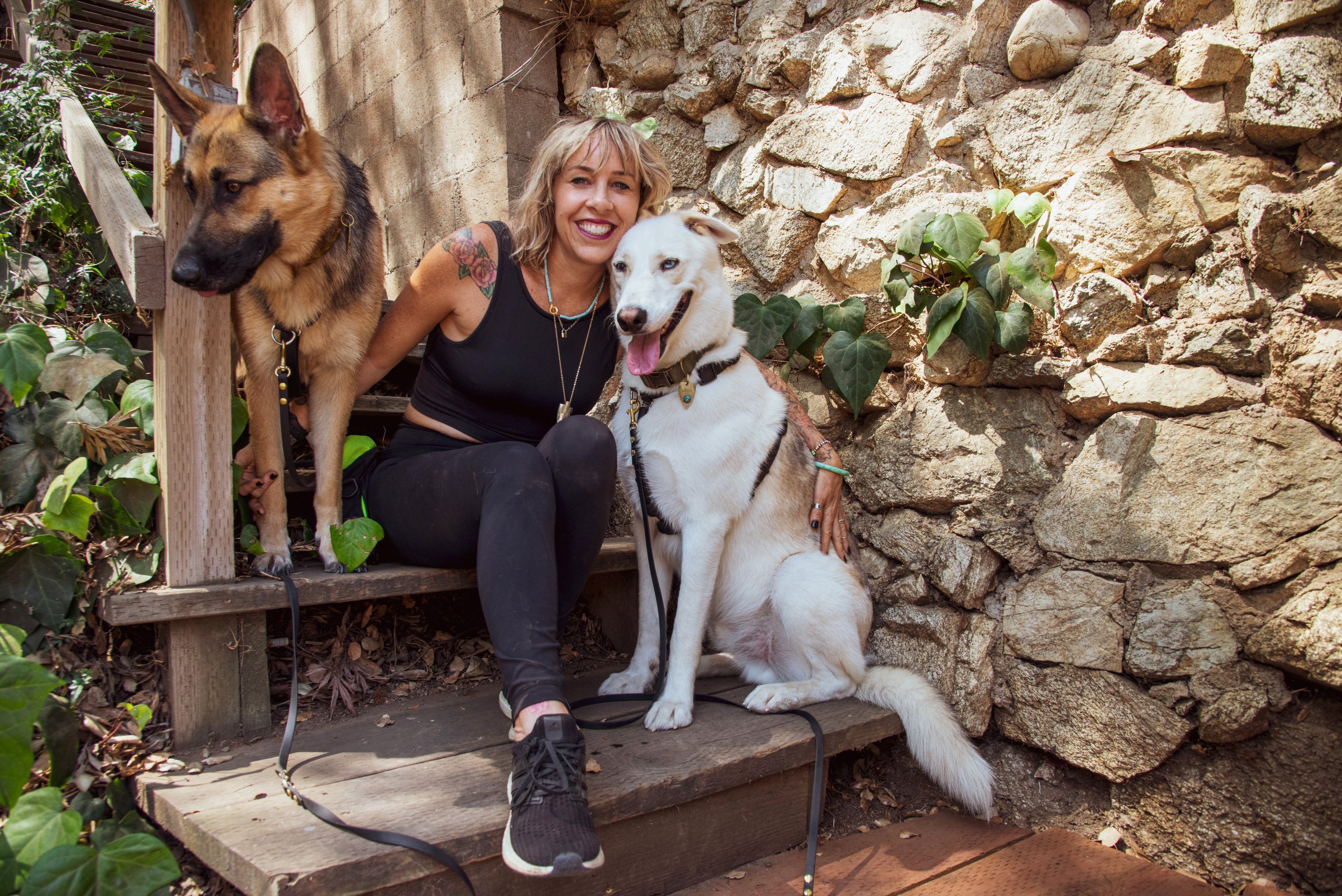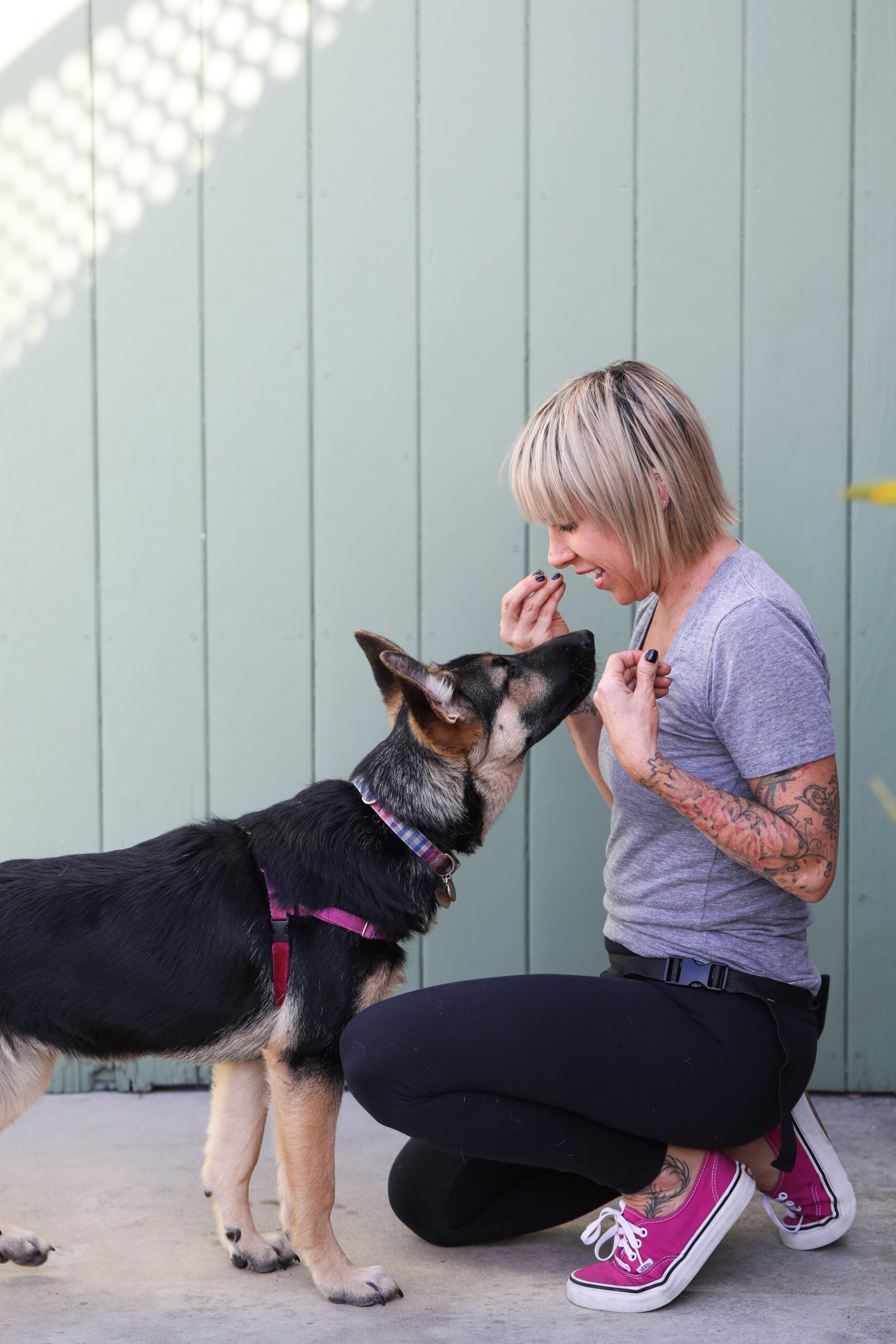
You’re not the boss of your dog.
You’re their best friend.
Whether you’re a first-time dog owner (congrats!) or a puppy pro, training a dog can be stressful for you and your dog. Here’s the good news: you don’t have to control your dog to get her to change, you just need to understand her.
Our force-free approach to training will help.
Our Force-Free Training Philosophy
Psychologist Dr. Susan Friedman said, “Behavior is a study of one.” If you need proof to back that up, look no further than dog training! Not only is every individual dog unique, but the caregiver, environment, and current conditions all affect a dog’s behavior (which is why your new puppy might be a perfect saint at home and a little devilish on his daily walks).
My goal with training is to help you recognize and appreciate the unique qualities of your own dog. Once we understand their needs, I can offer support and guidance as you learn the correct things to do with your dog. By the end of our time together, you will better understand your dog and be able to fully enjoy the human-dog relationship.
Our approach to dog training is fully science-based. However, unless you are familiar with the dog training world, you may not know that a lot of the old-school “science” has been debunked. The best known example is the myth of the Alpha Pack Theory that relied on aggression and control.
Instead of punishment or pain-inflicting training techniques, we believe in force-free training methods. Through targeting, socialization, and positive reinforcement, we can rehabilitate most dogs and teach them valuable cohabitation skills with their humans.
Underdogs Values
Our goal is to be the voice of underdogs everywhere. Whether that’s you, your dogs, or underserved and marginalized communities.
I am a certified animal trainer, using force-free methods backed by science. However, this doesn’t mean that I am no stranger to punishment— quite the contrary.
In my life and work, I am very well versed in aggression. I came from a childhood where punishment was a way to correct my behavior, as did my parents. This punishment style was a learned behavior, possibly a result of the environment and genetics.
I used to brag that I could out-mad anybody. Or that I could be tough “like a man” to be taken seriously.
I guess it’s no wonder that when I started training dogs, I found myself working under aversive dog trainers (we’re talking heavy duty stuff like kick corrections and shock collars). At the time, I thought that was Animal Science.

But luckily the universe threw me a bone and led me to positive reinforcement, the science of behavior, and in turn, a massive healing journey.
As I’ve dedicated my life to learning about behavior, I have also changed how I communicate in the world. I’ve been blessed with clients on similar healing journeys. We bond and grow while helping our animals heal as well as ourselves.
This journey has helped me understand why I once defaulted to punitive behaviors and helped set me on the right path.
Maybe that’s why I especially enjoy working with rescue dogs or misunderstood underdogs who may be experiencing excessive anxiety due to previous neglect or trauma.
Adjusting to family life can be tough for a rescue, but I would love to help your dog build confidence, learn new things, and live a truly enriched life. And I know that the only way to do that is to guide you to become a well-educated, compassionate dog owner.
Our Commitment to DEI
Underdogs Long Beach is committed to diversity, inclusion, equity, and anti-racism.
We recognize all types of diversity including ethnicity, race, gender, sexual orientation, gender identity, age, religion, and abilities. We acknowledge our own privilege and the ways in which we benefit from white supremacist systems.
It goes without saying that we love animals and we want to educate humans to be incredible animal advocates. But we also recognize and witness that many pets in the US have a better life than many people in the same country.
While we are proud to see animal advocacy work grow, we see very little advocacy for racism and human rights issues in our own city. At Underdogs, we will fight and advocate for humans with the same intensity that we do for dogs.
Going forward, we are making the following commitments to learning, unlearning, and taking tangible action:
-
As celebration and support of diversity of all kinds, we are donating 2% of our income to local BIPOC charities
-
We supplement our animal education with anti-racism and human rights education such as podcasts, courses, and books
-
We allow for open conflict and discomfort. We are looking to learn from our mistakes, so we will embrace uncomfortable conversations
-
Long-term, we want to hire BIPOC who are interested in working with animals
-
We have and will continue to talk about politics as a business. Many members and supporters of the animal advocacy community would rather “stick to animals,” but we refuse to be silent when it comes to human rights
We care deeply for the world and humans that have been marginalized. We feel strongly about our stance and will be speaking up against oppression. Right now, it is most important to fight for humans, against oppression, racism, and sexism. If you are looking for a dog trainer who only cares about dogs, we are probably not the right fit.
We recognize that this is lifelong work and we are open to having conversations about how we can better achieve this goal.